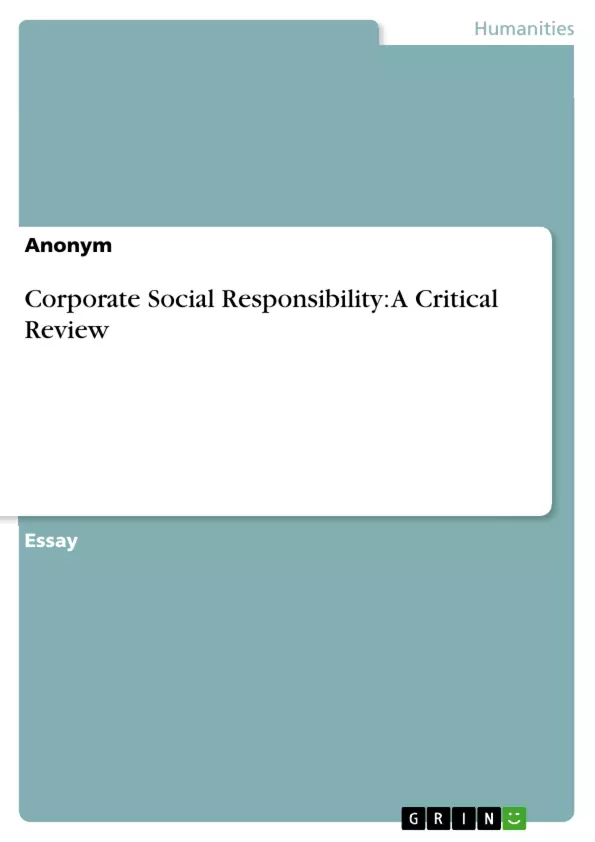Why do businesses exist? To earn profit? Or to serve a purpose? This essay aims to discuss the current role of big corporations in society and the importance and effectiveness of CSR principles and guidelines.
Inhaltsverzeichnis
- Why do businesses exist?
- What is Corporate Social Responsibility (CSR)?
- The role of big corporations in today's societies
- Success factors of the future
Zielsetzung und Themenschwerpunkte
This essay examines the contemporary role of large corporations in society and the significance and efficacy of CSR principles and guidelines. It seeks to understand how businesses can balance profit maximization with ethical considerations in a world increasingly focused on sustainability and social responsibility.
- The evolution of Corporate Social Responsibility (CSR) and its underlying principles.
- The impact of global trends like climate change and human rights abuses on corporate behavior.
- The role of stakeholders, including consumers, investors, and employees in influencing corporate social responsibility.
- The effectiveness of CSR guidelines and regulations in promoting ethical business practices.
- The challenges and opportunities for corporations to achieve both profitability and social responsibility.
Zusammenfassung der Kapitel
- The essay begins by exploring the historical context of CSR, contrasting the early focus on profit maximization with the modern expectation of social responsibility. It highlights the increasing emphasis on ethical considerations in business decision-making, driven by growing societal awareness of global issues like climate change.
- The second chapter delves into the definition and core principles of CSR. It examines the International Organization for Standardization's (ISO) guidance, based on the UN Global Impact, which emphasizes human rights, labor rights, environmental responsibility, and anti-corruption measures. However, it also highlights the lack of international binding laws and the challenges of enforcing these principles.
- Chapter three explores the role of large corporations in modern societies. It acknowledges the increasing demand for sustainable products and services but also points to examples of companies prioritizing profit over social responsibility through strategies like "greenwashing." The chapter discusses the limitations of current regulations and the need for stronger enforcement mechanisms.
- The fourth chapter examines success factors for companies in the future. It emphasizes the need for a balance between profit and morality, arguing that effective CSR management can enhance sales and brand reputation. The chapter highlights the importance of ethical commitments at all levels of the organization and the need for transparent communication about CSR initiatives.
Schlüsselwörter
This essay focuses on key terms such as Corporate Social Responsibility (CSR), business ethics, sustainability, environmental responsibility, human rights, stakeholder engagement, greenwashing, and corporate governance.
Frequently Asked Questions
What is Corporate Social Responsibility (CSR)?
CSR is a business model where companies integrate social and environmental concerns into their operations and interactions with stakeholders.
Do businesses only exist to earn profit?
While profit is essential, modern CSR principles argue that businesses must also serve a purpose in society and act ethically to be sustainable long-term.
What is "greenwashing"?
Greenwashing is a deceptive marketing practice where a company portrays itself as environmentally friendly while its actual practices are harmful or indifferent.
How do global trends like climate change affect CSR?
Increasing awareness of climate change and human rights abuses puts pressure on corporations to adopt more transparent and responsible business practices.
Are CSR guidelines legally binding?
Most CSR standards, like ISO 26000 or the UN Global Compact, are voluntary, which remains a major challenge for global enforcement.
- Quote paper
- Anonym (Author), 2022, Corporate Social Responsibility: A Critical Review, Munich, GRIN Verlag, https://www.grin.com/document/1264598



